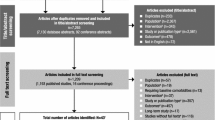Abstract
Aim
The aim of this study was to assess the impact of switching from immediate-release (IR) methylphenidate (MPH) to OROS® MPH (CONCERTA®), a once-daily long-acting MPH formulation, in children and adolescents with attention-deficit/hyperactivity disorder (ADHD).
Methods
Subjects with ADHD aged 6–16 (n=105),who were stably maintained on their current IR MPH regimen (10–60 mg/day), were switched to 18, 36 or 54mg OROS® MPH once daily for 21 days, depending on pre-study daily MPH dose.ADHD symptoms were assessed by parents, teachers and investigators.
Results
By Day 21, parent/caregiver IOWA Conners ratings had decreased from baseline by 2.7 points to 5.2 (I/O), and by 1.8 points to 5.0 (O/D). Teacher IOWA Conners ratings were maintained. Decreases in IOWA Conners ratings are indicative of ADHD symptom improvement. Approximately 75% of parents and investigators rated therapy as good or excellent. OROS® MPH therapy was well tolerated.
Conclusions
Switching from IR MPH to OROS® MPH maintained and may have improved symptom control in children and adolescents with ADHD, during the course of this study. The changes in parent/caregiver IOWA Conners ratings suggest that OROS® MPH improves symptom control in the after-school period. This is consistent with the 12-h duration of action previously demonstrated for OROS® MPH.
Similar content being viewed by others
References
AACAP (2002) Practice parameter for the use of stimulant medications in the treatment of children, adolescents, and adults. J Am Acad Child Adolesc Psychiatry 41(2 Suppl):26S–49S
Atkins MS, Pelham WE, Licht MH (1989) The differential validity of teacher ratings of inattention/overactivity and aggression. J Abnorm Child Psychol 17(4):423–435
Greenhill LL, Swanson JM, Vitiello B, Davies M, Clevenger W, Wu M, Arnold LE, Abikoff HB, Bukstein OG, Conners CK, Elliott GR, Hechtman L, Hinshaw SP, Hoza B, Jensen PS, Kraemer HC, March JS, Newcorn JH, Severe JB, Wells K, Wigal T (2001) Impairment and deportment responses to different methylphenidate doses in children with ADHD: the MTA titration trial. J Am Acad Child Adolesc Psychiatry 40(2):180–187
Klassen A, Miller A, Raina P, Lee SK, Olsen L (1999) Attention-deficit hyperactivity disorder in children and youth: a quantitative systematic review of the efficacy of different management strategies. Can J Psychiatry 44(10):1007–1016
Kutcher S, Aman M, Brooks SJ, Buitelaar J, van Daalen E, Fegert J, Findling RL, Fisman S, Greenhill LL, Huss M, Kusumakar V, Pine D, Taylor E, Tyano S (2004) International consensus statement on attention-deficit/hyperactivity disorder (ADHD) and disruptive behaviour disorders (DBDs): clinical implications and treatment practice suggestions. Eur Neuropsychopharmacol 14(1):11–28
Loney J, Milich R (1982) Hyperactivity, inattention, and aggression in clinical practice. In: Wolraich M, Routh DK (eds) Advances in Development and Behavioral Pediatrics. JAI Press. Greenwich, CT, pp 113–147
Miller A, Lee SK, Raina P (1999) Assessment of Attention Deficit/Hyperactivity Disorder: A Canadian Perspective—Technology Overview. In: Shukla KV, Otten N (eds) Canadian Coordinating Office for Health Technology Assessment
Pelham WE, Gnagy EM, Burrows-Maclean L, Williams A, Fabiano GA, Morrisey SM, Chronis AM, Forehand GL, Nguyen CA, Hoffman MT, Lock TM, Fielbelkorn K, Coles EK, Panahon CJ, Steiner RL, Meichenbaum DL, Onyango AN, Morse GD (2001) Once-a-day Concerta methylphenidate versus threetimes-daily methylphenidate in laboratory and natural settings. Pediatrics 107(6):E105
Pelham WE, Gnagy EM, Chronis AM, Burrows-MacLean L, Fabiano GA, Onyango AN, Meichenbaum DL, Williams A, Aronoff HR, Steiner RL (1999) A comparison of morning-only and morning/late afternoon Adderall to morning-only, twice-daily, and three times-daily methylphenidate in children with attention-deficit/hyperactivity disorder. Pediatrics 104(6):1300–1311
Pelham WE, Milich R, Murphy DA, Murphy HA (1989) Normative data on the IOWA Conners Teacher Rating Scale. J Clin Child Psychol 18:259–262
Schachter HM, Pham B, King J, Langford S, Moher D (2001) How efficacious and safe is short-acting methylphenidate for the treatment of attention-deficit disorder in children and adolescents? A meta-analysis. CMAJ 165(11):1475–1488
Stein MA, Greenhill LL (2002) Oncedaily Concerta (MPH) for adolescents and adult with ADHD. Int J Neuropsychopharmacol 5(Suppl 1):S162
Swanson J (2003) Compliance with stimulants for attention-deficit/hyperactivity disorder: issues and approaches for improvement. CNS Drugs 17(2):117–131
Swanson J, Greenhill L, Pelham W, Wilens T, Wolraich M, Abikoff H, Atkins M, August G, Biederman J, Bukstein O, Conners CK, Efron L, Fiebelkorn K, Fried J, Hoffman M, Lambrecht L, Lerner M, Leventhal B, McBurnett K, Morse E, Palumbo D, Pfiffner L, Stein MA, Wigal S, Winans E (2000) Initiating CONCERTA (OROS methylphenidate HCI) qd in children with attention-deficit hyperactivity disorder. J Clin Res 3:59–76
Swanson JM, Lerner MA, Gupta S, Shoulson I, Wigal S (2003) Development of a new once-a-day formulation of methylphenidate for the treatment of ADHD. Arch Gen Psychiatry 60(2):204–211
Wilens T, Pelham W, Stein MA, Conners CK, Abikoff H, Atkins M, August G, Greenhill L, McBurnett K, Palumbo D, Swanson J, Wolraich M (2003) ADHD treatment with once-daily OROS® methylphenidate: interim 12-month results from long-term open-label study. J Am Acad Child Adolesc Psychiatry 42(4):424–433
Wilens TE (2002) Treatment of ADHD with once-daily OROS methylphenidate: results from a long-term open-label study. Presented at 155th Annual Meeting of the American Psychiatric Association, Philadelphia, PA, May 18–22:2002
Wolraich ML, Greenhill LL, Pelham W, Swanson J, Wilens T, Palumbo D, Atkins M, McBurnett K, Bukstein O, August G (2001) Randomized, controlled trial of OROS methylphenidate once a day in children with attention-deficit/hyperactivity disorder. Pediatrics 108(4):883–892
Author information
Authors and Affiliations
Corresponding author
Rights and permissions
About this article
Cite this article
Remschmidt, H., Hoare, P., Ettrich, C. et al. Symptom control in children and adolescents with attention-deficit/hyperactivity disorder on switching from immediate-release MPH to OROS® MPH. Europ.Child & Adolescent Psych 14, 297–304 (2005). https://doi.org/10.1007/s00787-005-0467-6
Accepted:
Issue Date:
DOI: https://doi.org/10.1007/s00787-005-0467-6




